Celtic Cross Spread
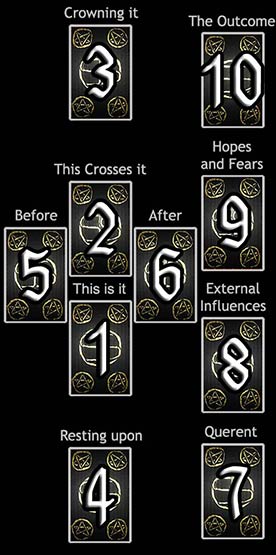
Difficulty: Average
This is probably the most well-known tarot spread. A good, basic spread for beginners to practise with, the Celtic Cross is useful for questions of all types. In this spread, it can be helpful to notice the relationships between the pairings of cards #5 & #9, #1 & #2, #3 & #4, and #6 & #10.
- The significator epitomizes what the reading deals with, the initial situation.
- An added impulse that compounds the significator, which may be either complimentary or contradictory.
- This is what is consciously known (thoughts).
- Unconscious driving forces that may not be known fully (emotions).
- The immediate past regarding the current situation.
- The first future card indicates the immediate future.
- This card represents the reader and their attitude towards cards #1 and #2.
- The external influences, the places and people which influence the topic.
- This tarot card suggests expectations; what is secretly hoped for or feared.
- The second future card reveals the long-term outcome.
Your Celtic Cross Reading
The Crown |
The Outcome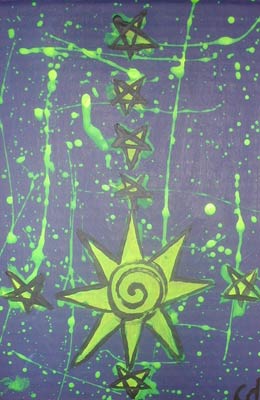 XVII. The Star
External Forces 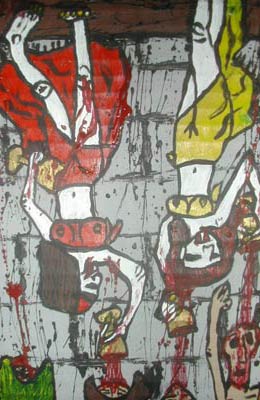 Four of Cups
|
||
The Recent Past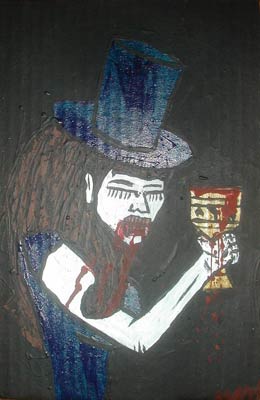 Queen of Cups |
The Crossing Card
|
The Future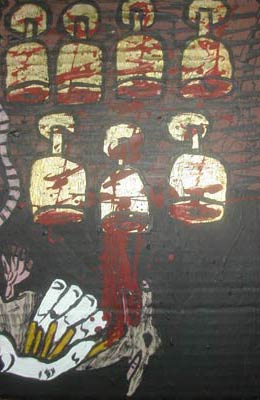 Seven of Cups |
|
|
|||
The Significator represents what the main theme of the reading deals with, the initial situation.
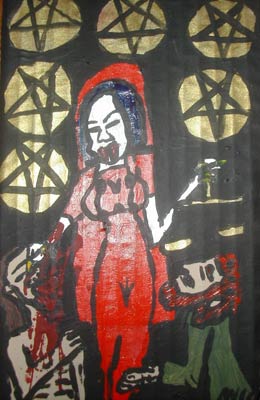
Six of Pentagrams
Symbolism:
Two men beg a seductive vampire, one drained, the other eager for his turn. This scene represents generosity, power dynamics, and the exchange of resources—both material and emotional.
Meaning:
The Six of Pentagrams signifies giving and receiving, with a focus on generosity and balance in exchanges. It may indicate a time when you are helping others or receiving aid, and it highlights the importance of fairness and reciprocity. It suggests prosperity through kindness, vigilance, and prudence.
Keywords:
Upright: Generosity, aid, balance, prosperity, reciprocity.
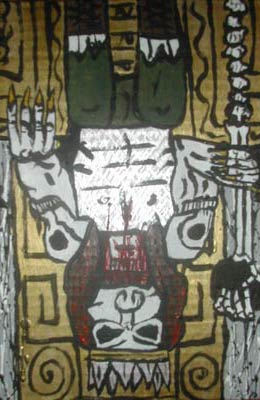
The Crossing Card denotes an added impulse that compounds the initial card, whether complimentary or contradictory.
IV. The Emperor
Reversed
Symbolism:
The Emperor is a Nosferatu seated on a blood-soaked throne, gripping the Hand of Glory as his scepter of authority. His crimson cloak flows like a river of lifeblood, symbolizing his dominion over life and death. Behind him, a craggy fortress rises, representing stability and the structures of power. His stern, commanding gaze reinforces his role as a protector and enforcer of order.
Meaning:
The Emperor symbolizes authority, stability, and protection. He represents the need for structure and discipline to achieve goals and maintain order. As a figure of leadership, he encourages reason and conviction in decision-making. This card often indicates a time to take control of your environment or to rely on a strong, supportive figure for guidance.
Reversed, the Emperor warns of rigidity, tyranny, or a loss of control. It may signify struggles with authority, immaturity, or the misuse of power.
Keywords:
Reversed: Tyranny, rigidity, immaturity, chaos, rebellion, over-control.
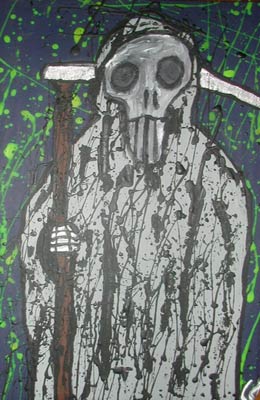
The Crown stands for what the asker is aware of consciously.
XIII. Death
Symbolism:
Death is depicted as a cloaked, skeletal figure riding a dark horse with glowing red eyes. In one hand, it wields a scythe, its blade glinting in the moonlight, while the other hand scatters withered petals onto the barren ground. The landscape around them is bleak, with twisted trees and ruins, but in the distance, the faint glow of dawn promises renewal. At the figure's feet, flowers begin to bloom amid the decay.
Meaning:
Death symbolizes transformation, endings, and the promise of new beginnings. It encourages you to release what no longer serves you, making way for growth and renewal. This card often marks a significant transition or the closure of a chapter in life, reminding you that every ending carries the seed of a new beginning.
Keywords:
Upright: Transformation, endings, renewal, release, change, rebirth, closure.
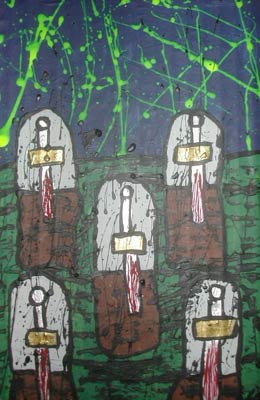
Foundation card reveals unconscious driving forces that the querent may not be aware of.
Five of Swords
Symbolism:
Five swords mark the freshly disturbed graves of the dead, symbolizing destruction and dishonor.
Meaning:
The Five of Swords indicates conflict, defeat, and hollow victory. It reflects situations where someone might win, but at a significant personal or moral cost. The card highlights dishonor, humiliation, or regret after a battle.
Keywords:
Upright: Conflict, loss, dishonor, defeat, infamy.

The Recent Past represents past events and concerns.
Queen of Cups
Symbolism:
The beautiful Queen of Cups toasts to the abundance of victims willing to sacrifice themselves for the vampires' pleasure. The Queen embodies nurturing energy but also the darker, seductive side of emotional power.
Meaning:
The Queen of Cups represents emotional wisdom, intuition, and nurturing. She is deeply connected to her emotions and offers guidance in matters of the heart. This card symbolizes compassion, empathy, and the ability to heal through love. The Queen also represents a woman who has a strong emotional presence and offers emotional support to those around her.
Keywords:
Upright: Emotional wisdom, intuition, compassion, nurturing, healing, emotional intelligence.

The Future depicts that which lies ahead.
IV. The Emperor
Reversed
Symbolism:
The Emperor is a Nosferatu seated on a blood-soaked throne, gripping the Hand of Glory as his scepter of authority. His crimson cloak flows like a river of lifeblood, symbolizing his dominion over life and death. Behind him, a craggy fortress rises, representing stability and the structures of power. His stern, commanding gaze reinforces his role as a protector and enforcer of order.
Meaning:
The Emperor symbolizes authority, stability, and protection. He represents the need for structure and discipline to achieve goals and maintain order. As a figure of leadership, he encourages reason and conviction in decision-making. This card often indicates a time to take control of your environment or to rely on a strong, supportive figure for guidance.
Reversed, the Emperor warns of rigidity, tyranny, or a loss of control. It may signify struggles with authority, immaturity, or the misuse of power.
Keywords:
Reversed: Tyranny, rigidity, immaturity, chaos, rebellion, over-control.
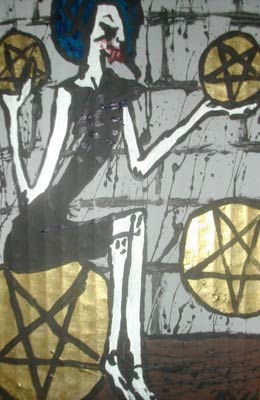
The Querent represents the asker and their attitude towards the subject of the reading.
Four of Pentagrams
Symbolism:
A beautiful female vampire sits calmly, working her magic during the witching hour. She holds a pentagram close to her chest, representing control and possession over her material world. Her aura suggests a deep connection to both wealth and personal power.
Meaning:
The Four of Pentagrams signifies possessiveness, control, and the need to protect what has been earned. It speaks to holding onto resources, whether material or emotional, and the desire for stability and security. While this card suggests financial or emotional strength, it may also point to an unhealthy attachment to these possessions.
Keywords:
Upright: Possession, control, stability, material success, security.

External Forces represents the influence of others in your life as well as trends in your relationships with others.
Four of Cups
Reversed
Symbolism:
Two female vampires revel in the night, intoxicated by an excess of life force. Their satiation and indulgence highlight the dangers of overindulgence, while the cups represent both nourishment and excess.
Meaning:
The Four of Cups suggests the enjoyment of life, novelty, and pleasure. It indicates a time for exploration and a renewed sense of joy. This card can point to social events or gatherings where joy is found in connection and revelry. It also symbolizes the introduction of new opportunities, making it a time of emotional satisfaction and new connections.
Reversed, the card warns of weariness, aversion, or dissatisfaction despite indulgence. It may point to disillusionment with current pleasures or a sense of boredom in relationships.
Keywords:
Reversed: Weariness, dissatisfaction, aversion, boredom, disillusionment.
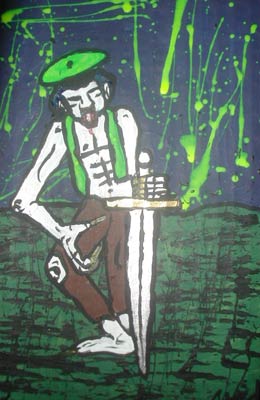
Hopes and Fears shows the expectations you have concerning the outcome of your question.
Page of Swords
Symbolism:
A young Page stands vigilant, holding his sword balanced with its tip pointed earthward. His posture conveys readiness, alertness, and a cautious approach to potential threats. Though at rest, his eyes scan the horizon, reflecting curiosity and a hunger for knowledge.
Meaning:
The Page of Swords represents curiosity, observation, and a keen intellect. It suggests a time for learning, exploration, or gathering information before acting. This card often represents someone who is eager to uncover truths or defend their beliefs with determination.
Keywords:
Upright: Vigilance, observation, curiosity, intellect, communication, preparation.

The Outcome of your question. Interpret this card in the context of the entire reading and as an indicator of the path you are currently on, but not necessarily bound to.
XVII. The Star
Symbolism:
The Star depicts a luminous vampire bathing in a moonlit pool, her pale skin shimmering with starlight. She pours blood from a goblet into the water, symbolizing renewal and the cycle of life. Above her, a constellation forms the shape of a chalice, representing hope and inspiration. The night sky is clear, and the surrounding landscape, though desolate, begins to show signs of new growth.
Meaning:
The Star embodies hope, inspiration, and spiritual renewal. It encourages you to trust in the universe and your own inner light, even during challenging times. This card often appears after a period of struggle, signaling healing, clarity, and the promise of brighter days ahead.
Keywords:
Upright: Hope, inspiration, renewal, clarity, healing, optimism, spirituality, guidance.
